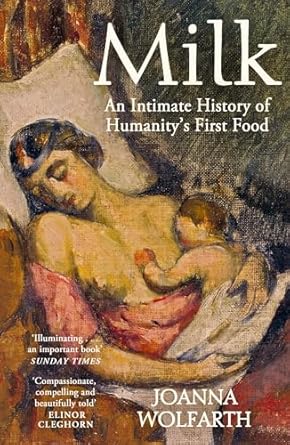Milk: humanity's first food
- Joanna Wolfarth interview

- May 8, 2025
- 7 min read
Joanna Wolfarth is an art historian and author of Milk: An intimate history of humanity’s first food. Previously visiting lecturer in Southeast Asian Art at SOAS, University of London, she now teaches History of Art at The Open University. You can find her at www.joannawolfarth.com
What kind of messages about breastfeeding did you grow up with, and how did they shape your expectations going into motherhood?
We are told antenatally that breastfeeding is the best and it's easy and you just put your baby on the boob and the baby will latch. I grew up in a household that was very breastfeeding orientated. I watched siblings and cousins breastfeed. I took on that message about breastfeeding being natural, what my body is designed to do.
It was such a shock having my first baby and finding out that they weren't very good at latching and getting the milk out, and that it was a skill that we were both going to have to learn together. That was such a brutal shock along with all the other brutal shocks of having given birth for the first time and new motherhood.
I don't want to put forward the idea that breastfeeding is always difficult because it varies for everybody. But when I started researching Milk I realised that ideas of what is ‘natural’ are sociologically and culturally determined. There's a vast difference between me being a mother in the UK in the 2020s versus a mother in a different cultural context in the world or in a different historical period. And I think the main takeaway of my research was that breastfeeding doesn't happen in a vacuum. It happens with all of the other baggage and social stuff that you've got going on.
The idea of the acceptability of women in Western Europe breastfeeding their own babies, particularly wealthy or high status women has shifted over time. This idea of the ‘natural’ mother who breast feeds and is very serene and nurturing, and all of those things that might come to mind when we think of a breastfeeding mum, so much of that is tied into 18th century Enlightenment ideas of the maternal and the nurturing woman. It’s at this point in history we start to see the separation of the idea of the maternal mother or the maternal woman and the sexual woman. People (mostly men) started pushing the idea that breastfeeding was the natural and moral thing for a woman to do.
How has the connection between feeding choices and social class changed over time?
Breastfeeding rates and whether or not you encounter more breastfeeding or bottle feeding at baby groups is really dependent on demographics. For most of history when we talk about an alternative to the mother breastfeeding we’re talking about wet nursing or allo-nursing (ie. shared feeding, whereby another woman will breastfeed a baby), because formula only comes into the picture towards the end of the 19th century. Wet nursing has always happened, even before it was a recognised profession, for instance where a mother can’t breastfeed perhaps because of illness , or because she has to go away from the community for a short period of time.
For a number of reasons within our own culture we view wet nursing as incredibly taboo. We’re really uncomfortable with it. But wet nursing has been a profession for millennia. We've got contracts drawn up and historical documents going back at least 3000 years. We can learn a lot about breastfeeding history from wet nursing history because we've got the archival documents. High status women would have had wet nurses. In ancient Mesopotamia, in Egypt, in ancient Greece and Rome, wet nurses were employed. There are several reasons for that. One is that breast milk or breastfeeding is some form of contraception, not a reliable form of contraception, but you tend not to be as fertile while you're breastfeed. So if you're a high status woman, your husband might want you to get back to producing heirs. Another reason you might have a wet nurse is because of the toll that breastfeeding might take on your body and your time. At other times in history there were other contributing factors. In the UK around the Elizabethan period there was the belief that sexual intercourse heated up your body and it would make your milk go bad and so the idea was that you couldn't have sex while you were breastfeeding.
At certain points in history wet nursing falls out of favour. At periods during the Italian Renaissance mothers were encouraged to nurse their own babies because there was a syphilis outbreak and a risk of wet nurses passing that on to your child.
By the time we get to Western Europe at the end of the 18th century, wet nursing is theoretically falling out of favour. It loses its appeal for aristocratic women. There’s always been the idea that characteristics might be passed on from a wet nurse to the baby through the milk, but also through the socialisation that the baby would be having with the wet nurse. That you need to choose a wet nurse wisely is found in documents from all over the world, including very early Sanskrit texts from India. But by the 18th-century in Europe, you have all of these men writing pamphlets, blaming their adult ill health on the poor quality of their wet nurses. And there's some really horrific things written about the characteristics and personalities of these wet nurses. At the same time there is a better understanding that sex is not going to spoil your milk and so it became much more fashionable or expected to nurse your own baby.
In art we get lots of visual representations of caricatures of terrible wet nurses feeding babies booze or beautiful paintings of very serene looking aristocratic women dressed in their finery feeding beautiful milky little babies. Motherhood is pushed as the ideal of womanhood, the most emotionally satisfying thing for women.


The philosopher Rousseau, whose own five children were all sent to a foundling hospital, writes about how breastfeeding instills moral goodness into babies and so it’s not just important for the baby but for the whole of society. He said that if mothers return to breastfeeding their babies, ‘the natural feeling will revive in every heart and when women become good mothers, men will be good husbands and fathers’. This glaring hypocrisy still feels very familiar. There’s such an importance placed on what we should do as mothers but the support to enable us to meet these expectations is often absent. For example we’re under pressure to be always present for our children and look after them at home, but the economic reality makes that impossible for many families.
In France at the end of the 18th century there was a strong pressure to breastfeed for the good of the nation but middle class women in Paris simply couldn’t afford to not work- the rents were so high. In 1780 there were about 21,000 babies born in Paris and only 1,000 remained in the city. The rest were sent out to rural areas to be nursed because there was no viable economic alternative for their mothers. This clash of the cultural pressure to be maternal and breastfeeding and the reality of the industrial world continues throughout the Victorian era. More and more women are working, they’re working outside the home, they are forced away from smaller community networks and they’re meant to simultaneously be all-present, nurturing, breastfeeding. It seems to me that women have always been put in a slightly impossible position. It’s unwinnable.
I’m not an evolutionary anthropologist but I don’t see how we would have survived as a species if mothers had always been expected to mother as intensively and in such isolation as we are today.
You need some to help with the practicalities in the early days of breastfeeding. To bring you loads of water, drop off food. But you also need a network of more experienced breastfeeders who can tell you how to hold the baby more comfortably, or a different technique to try if you’re facing a particular problem. Research is showing how in the communities we would have lived in for most of human history, mothers would have cared for their children but they also would have left their children, even very young children, in the care of others whilst they performed other work. I think understanding the broader historical picture is so important for helping us navigate the choices and pressures we face in motherhood.
From everything you learnt in the researching and writing of Milk, what’s the most important thing you’d like to change about how we discuss breastfeeding?
I’d like to change the way we discuss breastfeeding to recognise the historical context that got us where we are today, to recognise that breastfeeding doesn’t happen in a vacuum. Yes breastfeeding is ‘natural’ but ‘natural’ does not mean easy, best or good. What we think of as natural is actually quite a constructed idea. There’s a lot of nuance and context and variables that get overlooked when we focus on false dichotomies like ‘breast vs bottle’.
I think the most important thing I learned from Milk is how, when you look at the long history, patriarchy inserts itself at every point to impact breastfeeding.
Patriarchal ideas and structures affect whether women are breastfeeding, which women breastfeed, how, and how we characterise the women that do the labour of breastfeeding. These ideas are all connected to how we control women's sexuality and autonomy.
The world and mothering would look radically different if we lived under a matriarchy instead.









Comments